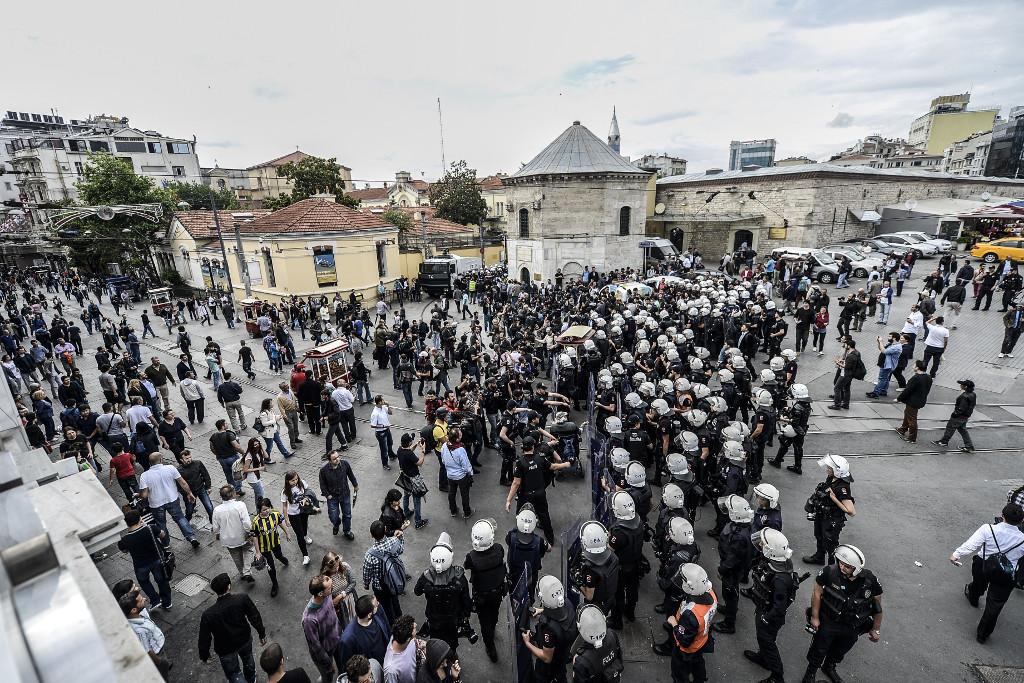Turkish police fire teargas on demonstrators marking Gezi protests anniversary
Turkish riot police officers block access to Taksim Square on May 31, 2014, during the one year anniversary of the Gezi park and Taksim square demonstrations.
Turkish police on Saturday used teargas in central Istanbul to disperse protesters seeking to mark the one-year anniversary of the start of the biggest anti-government demonstrations in decades.
Several hundred people gathered on streets leading to Taksim Square, shouting for the government's resignation, when police fired teargas at the crowd, which quickly scattered.
Earlier in the day, authorities closed roads and public transportation to deny access to Taksim to prevent demonstrations. Efforts to save a park at Taksim from government development plans sparked last year's unrest.
Turkey's combative prime minister warned protesters that police would do "whatever is necessary" to clamp down on demonstrations Saturday in Istanbul's Taksim Square.
As police deployed some 25,000 officers as well as dozens of water cannon trucks and armoured vehicles to prevent would-be demonstrators from reaching the square, Turkey's Prime Minister Recep Tayyip Erdogan vowed tough anti-protest measures.
"I am calling on all my people. Do not be deceived. This is not an environmentalist campaign. There is no sincerity here," Erdogan told thousands of supporters at an Istanbul rally.
"If you go there, our security forces have received clear-cut instructions and will do whatever is necessary from A to Z," said the premier.
"You will not be able to take to (Taksim) like you did last year because you are obliged to abide by the laws… If you do not, the state will do whatever is necessary for its security," he warned.
His address was often interrupted by loyalist slogans of "Turkey is proud of you!"
Last year, what started as a small campaign to save the nearby Gezi Park from the bulldozers eventually drew an estimated three million protesters in an outpouring of anger at the perceived authoritarian tendencies of Erdogan's Islamic-rooted government.
Eight people died and thousands were injured in the ensuing violence as police launched a brutal crackdown, frequently employing tear gas and water cannon.
"Despite these policies of violence and injustice, we will be on the streets," vowed Mucella Yapici, founding member of the activist group Taksim Solidarity.
"The government maintains a tense atmosphere that encourages police violence," she charged.
Meanwhile, Istanbul governor Huseyi Avni Mutlu said this week: "We know what happened in June last year and it is not a good memory … We do not want to see such sorrow again."
Police blocked streets Saturday leading up to Taksim Square and metro transport to the square was halted. According to local media, Bosphorus ferry services were cancelled.
"I am trying to remember all the voices and the sounds I heard here last year. You can't erase those memories," 41-year-old Sebnem, an actress, said early Saturday before the Gezi Park was closed.
Ugur, 31, a teacher, said: "We will long remember all the people who lost their lives here, as well as the way our state behaved."
The story you just read is accessible and free to all because thousands of listeners and readers contribute to our nonprofit newsroom. We go deep to bring you the human-centered international reporting that you know you can trust. To do this work and to do it well, we rely on the support of our listeners. If you appreciated our coverage this year, if there was a story that made you pause or a song that moved you, would you consider making a gift to sustain our work through 2024 and beyond?
